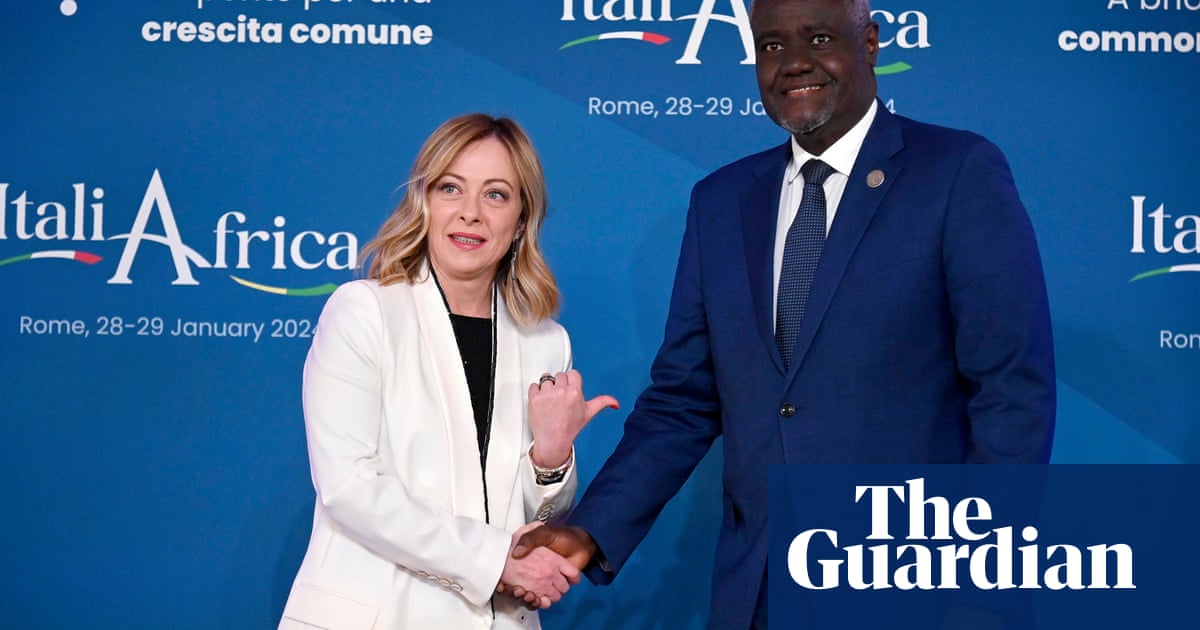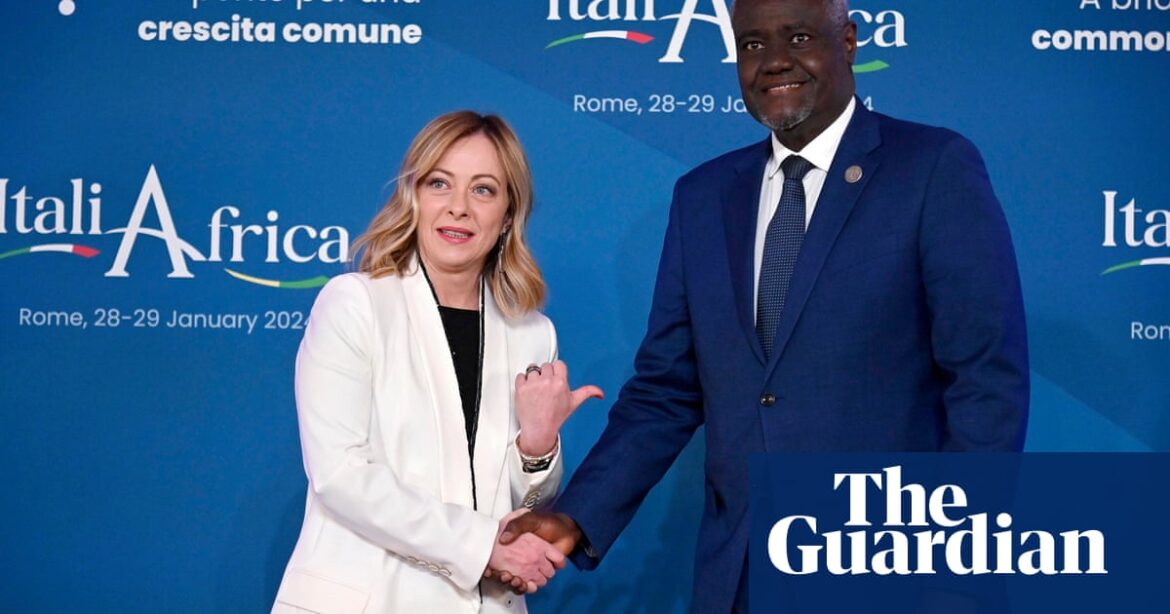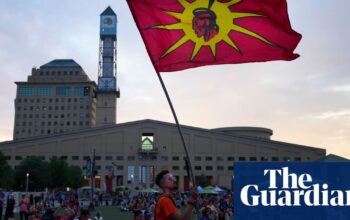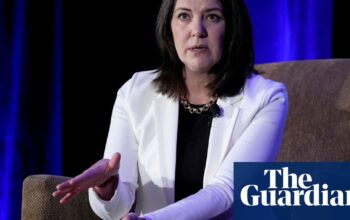
The head of the African Union Commission declared that “we are not asking for charity,” while the Italian prime minister, Giorgia Meloni, proposed a strategy to support the development of African nations in exchange for reducing illegal immigration.
During his speech at the highly anticipated Italy-Africa summit in Rome, Moussa Faki expressed his appreciation for Italy’s efforts to improve relations with the African continent for the benefit of both parties. However, he also stated that empty promises are not enough to satisfy our needs.
Faki expressed the need for a “paradigm shift” to establish “a fresh approach to collaboration” and pave the path for “a fairer and more unified global community.” He emphasized, “Africa does not seek to beg or plead, we want equal footing.”
Representatives and leaders from 45 African countries, such as the presidents of Tunisia, Senegal, Kenya, the Republic of the Congo, Zimbabwe, and Somalia, gathered in Rome to learn about Meloni’s “Mattei Plan”. This major policy is based on the ideas of Enrico Mattei, the founder of Eni, an oil company. In the 1950s, Mattei advocated for Italy to assist African nations in utilizing their natural resources and enhancing their economies.
The gathering, held at the esteemed Palazzo Madama where the Italian senate resides, was also graced by the presence of Ursula von der Leyen, President of the European Commission, Charles Michel, President of the European Council, and Roberta Metsola, the leader of the EU parliament.
At the start of the event, Meloni announced that the project will receive over €5.5 billion (£4.7 billion) in initial funding for investments in various areas such as energy, education, health, and infrastructure.
Meloni expressed a desire to create a new chapter in our collaborative history. She acknowledged that there have been instances of one-sided narratives in the past, particularly in portraying Africa as a poverty-stricken continent. However, she emphasized that this is not an accurate portrayal as Africa possesses abundant natural resources and a burgeoning young population.
Meloni stated that the project would involve working together as equal partners and avoiding any type of exploitative dominance or condescending attitude towards Africa.
In October 2022, shortly after her far-right government came into power, the prime minister of Italy unveiled her Africa plan. The primary objective of this plan is to make Italy a leading energy hub as Europe moves away from dependence on Russian gas.
Meloni’s main concern in supporting the growth of African economies is addressing the issue of migration from the continent, a promise she has yet to fulfill despite it being a key campaign focus.
Meloni has been advocating for assistance to be provided to individuals migrating from Africa within their home countries. She emphasized the importance of combatting human trafficking as a key aspect of this plan. Additionally, she stated that individuals have a fundamental right to not be compelled to migrate in search of a better life, which can often be challenging to attain in Europe.
During the summit, she stated that halting mass immigration and defeating human traffickers is impossible without addressing the underlying reasons that compel individuals to leave their homes.
Meloni is working to make Italy a leader in increasing European influence in Africa. She stated that the attendance of EU leaders at the summit shows Europe’s backing for her country’s efforts.
Von der Leyen stated that there is currently a strong and revived partnership between Africa and Europe, as our fates and interests are more closely aligned than ever before.
According to Metsola, twelve out of the twenty most rapidly developing economies globally are located in Africa. She also stated that when Africa thrives, so will Europe and the rest of the world.
Raffaele Marchetti, an international relations professor at Luiss University in Rome, noted that Meloni is taking advantage of the weakened positions of France and Germany in Africa in order to enhance Italy’s influence.
According to the speaker, Italy has a significant chance to make progress. The country also has a unique historical background – while it was once a colonial power, it differed from others in its approach. This makes it perceived as capable of forming mutually beneficial partnerships.
Riccardo Magi, the leader of the minor left-leaning political party Più Europa, stated that there was still a lot of confusion surrounding the implementation of the plan’s goals.
He was doubtful of Von der Leyen attending the summit. Magi expressed, “She has previously attended [with Meloni], such as for the EU’s failed migration agreement with Tunisia last summer. Her presence no longer ensures reliability or credibility.”
According to Anna Bono, a lecturer in African history at the University of Turin, the Mattei plan should be welcomed.
She stated: “However, I believe the greatest challenge lies in finding African leaders who are genuinely committed to the development of their countries. This involves refraining from treating their countries as personal assets to be exploited, as many African leaders currently do.”
On Monday, a new development occurred in which the constitutional court of Albania approved a contentious agreement with Italy to establish two holding facilities for individuals rescued in waters near Italy.
In November, Meloni declared an agreement that would lead to a non-EU country initially accommodating around 3,000 individuals and eventually handling up to 36,000 per year.
Under the deal, which has been criticised by human rights groups but tacitly endorsed by the EU, those allocated to Albania would be people rescued by Italian boats. Minors, pregnant women and vulnerable individuals would be taken to Italy.
In December, Albania’s constitutional court caused an obstacle by preventing lawmakers from ratifying the legislation. The chief judge, Olta Zaçaj, has scheduled a hearing for Thursday to assess if the agreement goes against Albania’s constitution.
Some critics argue that the agreement, similar to the UK’s deal with Rwanda, poses various legal challenges. They believe that for Italy to exert its authority in Albania, Tirana would essentially have to give up a portion of its land to Rome.
On Monday, the highest court in Albania released a statement declaring that the agreement does not pose a threat to the country’s territorial integrity.
The court’s decision was made shortly after Italian MPs supported the agreement. The lower chamber of parliament voted 155 to 115 in favor of the protocol, with two abstentions.
The text will now be sent to the senate, where it is expected to receive approval.
Source: theguardian.com



